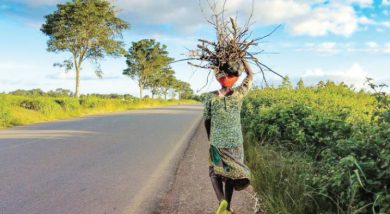Healthy farmers, healthy harvest
Agnes Mwale, 45, has never had formal employment. To survive, she farms a small piece of land a stone’s throw away from her village.
For years, she has been able to feed her five children, but in 2019, she had health problems that affected her farm work.
“The problem started when I gave birth to my last born child,” says Agnes. “I had prolonged labour and when the child was born, the doctors told me I developed a hole between the birth canal and ended up developing fistula.”
Despite being treated, the two years Agnes was suffering from fistula left her failing to produce enough food for her family. Sadly, she also lost her husband during the same period.
“My late husband’s brother took advantage of my illness and grabbed part of my land,” she says. “Although I am now okay, my family is too big to survive on the remaining piece of land.”

Agnes’ story is one of the many problems faced by women in Malawi. Currently, women represent 70 percent of the labour force in agriculture.
However, their productivity is affected by limited access to sexual reproductive health and rights (SRHR) services and gender-based violence (GBV).
Men, although they represent a smaller percentage of the labour force, are also equally affected by SRHR-related issues.
Over the years, Malawi has seen an increase in cancer cases, in both males and females, which is seriously debilitating agricultural productivity.
According to the World Health Organisation, the country recorded 17 936 new cases of cancer in both sexes and all ages in 2020.
To address these issues, the Food and Agriculture Organisation (FAO) of the United Nations, the United Nations Population Fund (UNFPA) and the Government of Malawi have rolled out a new SRHR training module targeting agricultural extension workers and lead farmers.
The module, being delivered as part of farmer field school (FFS) master trainers’ course, recognises SRHR and GBV as other constraints that can negatively affect agricultural productivity.
“Inclusion of this module in FFS training aims to contribute to empowering women and men to make an important decision that will affect the quality of life of their entire family,” says FAO representative Zhijun Chen.
In Malawi, early pregnancy remains a major challenge with 29 percent of girls aged between 15 and 19 bearing children, representing 25 percent of all pregnancies annually.
The high rate of teen pregnancy can be attributed to unmet needs, and limited access to SRHR, including family planning.
The limited access to family planning commodities by young people, who make 85 percent of the population, impacts agricultural productivity. This is through influence on population growth, which significantly influences demand for food against shrinking land resources.
Says UNFPA representative Young Hong: “Family planning helps the parents think about the future of the family and giving them power to analyse their situation and respond to the challenges actively, by spacing children to suit their financial capacity and mental and physical health.
“To create wealth of all Malawians, parents need to think ahead and make an adequate investment in children. Family planning in any context, including agriculture, means planning for the family’s future.”
During one of the FFS training sessions held in Kasungu, agriculture extension workers from across the country hailed the introduction of the SRHR module as a ‘game changer’.
One of the participants, Nancy Kamwendo Namanja, said she had been teaching about SRHR, but did not have much knowledge to delve much into the topic. And she saw the module greatly helping her support farmers improve productivity and at the same time, ensuring they live a healthy life.
“If farmers are always ill, it means no time to work in the fields,” says Nancy, adding: “And this leads to low yields and, eventually hunger for the household”.
FAO and UNFPA target to train 600 master trainers, who are largely extension workers from the government. When the master trainers go back to their different districts, they again train community-based facilitators, who now go and establish farmer field school outreach groups.
Overall, the project will train 8 000 community-based facilitators. Currently, 7 758 have been trained, who have then formed 13 400 farmer groups. This translates to close to 400 000 households having access to information on SRHR.





